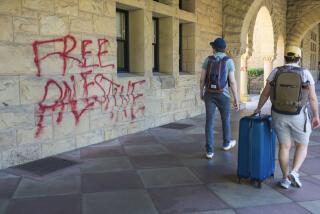From Shelter to Stanford, Student Makes the Grade
- Share via
Arriving for her freshman year at Stanford University last September, 17-year-old Lupe Vasquez looked forward to a new beginning.
There, no one would have to know that she, her parents, and her four brothers and sisters had been evicted from the one room they shared before taking refuge at a homeless shelter in Oxnard.
“I was embarrassed. . . . I didn’t want anyone to feel sorry for me or put me down,” Vasquez said.
But word leaked out about her escape from poverty, and her humility earned her the public’s admiration.
Vasquez, now 18, has been home for the summer at the shelter, preparing for her second year of college. She has become a role model for other struggling minorities, especially her 16-year-old sister, Virginia.
“I’m very proud of her. She motivated me to do well in school,” said Virginia, who wants to be an English teacher.
Vasquez’s family has shared a crowded room at Zoe Christian Center, a shelter for the homeless, for about two years to save money for an apartment. At Zoe, about 45% of the residents are younger than 16, said Fred Judy, founder and administrator of Zoe.
“We are really proud of her. . . . She’s making an impact on a lot of the kids because they see her and say, ‘She’s one of us, so if she did it, we can do it too,’ ” he said. “She is the first one from Zoe to go to college, let alone Stanford.”
Vasquez was one of the few, if not the only, homeless students admitted to the prestigious university, where she maintains a B+ average and hopes to get a Ph.D. in physics.
She was ranked second in her Oxnard High School class with a grade-point average of 4.4 out of a possible 5. Despite attending five high schools, she was accepted to all six California universities where she applied last fall.
Vasquez was motivated to stay at the top of her class by a dream of wealth. “I dreamed that I would never have to see something in the store that I wanted and not be able to buy it and that my mother would never have to work in the fields again,” she said.
“I would see her breaking her back working in the fields and it was painful to watch. I always wished there was something I could do.” She saw education as a way to avoid taking the same path her parents had.
Vasquez has received a lot of publicity and recently sold the rights to her life story to television producers wanting to make a movie out of it. The $2,000 she received up front from the deal is just a drop in the bucket for her $22,000-a-year education.
“It’s kind of weird being exposed to the whole world. . . . At first I was worried about people finding out, but after a while it wasn’t a big deal anymore,” Vasquez said.
Vasquez is financing her education through several loans, grants and scholarships. But that’s still not enough, so she’s working two summer jobs.
In the mornings, she works for California Rural Legal Assistance doing research on the effects of pesticides on farm workers. In the afternoons, she works at a bank.
“Work is kind of a relief. It is much easier than school because you don’t have to take your work home with you,” she said. “School is a 24-hour job . . . but I still love it because it’s a challenge and you’re always using your brain.”
She’s looking forward to school resuming Sept. 26, even though “it was so hard and very competitive. Everyone there is cream of the crop.”
Regardless of the obstacles, Vasquez said she’ll make it. “My ultimate goal is to obtain my Ph.D. to do research so I can help my parents and my community.”
More to Read
Sign up for Essential California
The most important California stories and recommendations in your inbox every morning.
You may occasionally receive promotional content from the Los Angeles Times.













